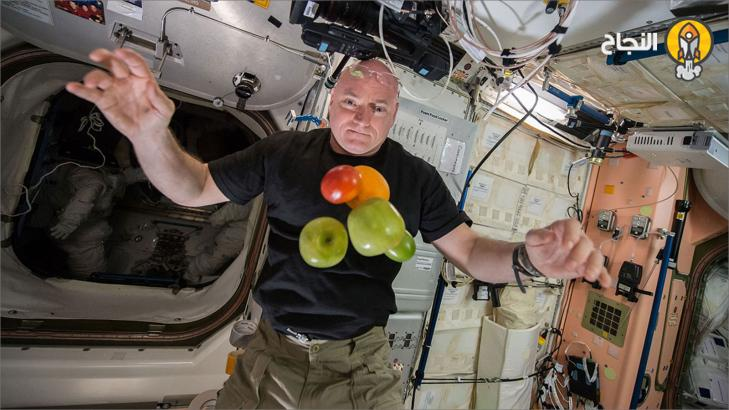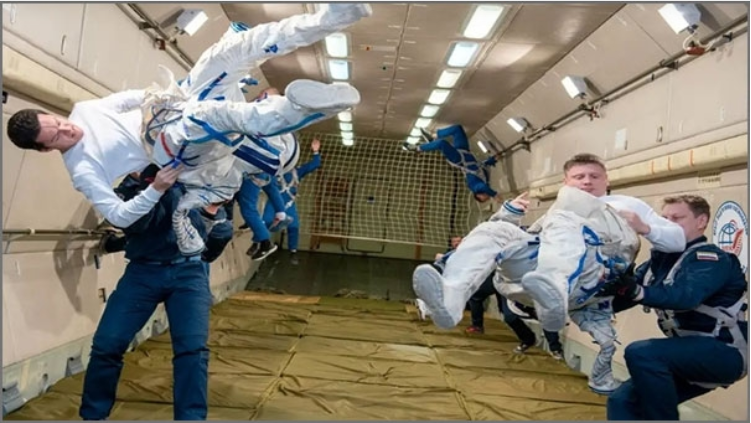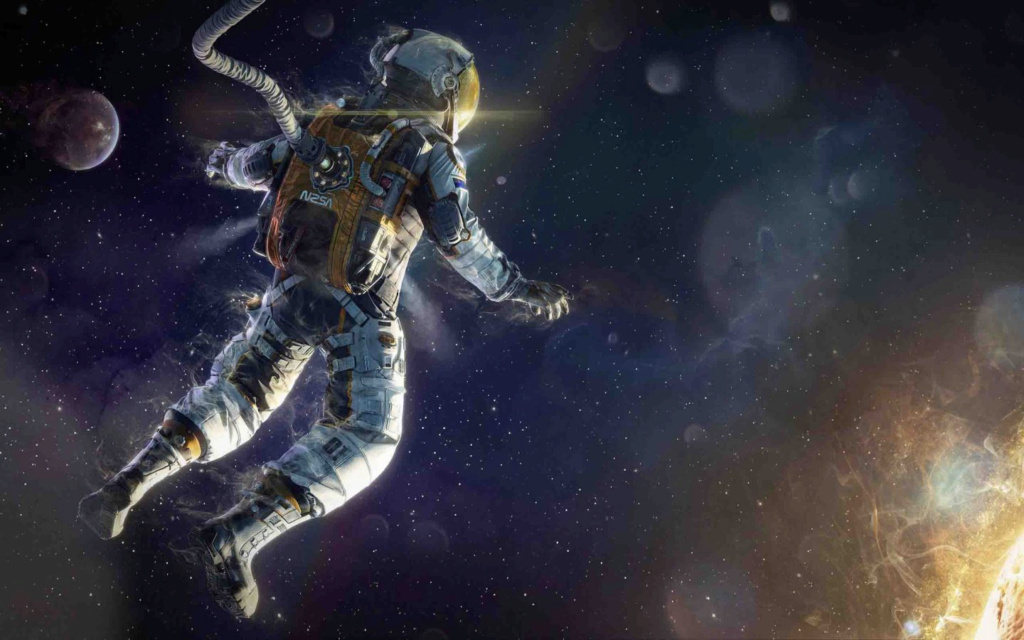There is no gravity in space: a scientific fallacy

We have always seen in documentaries and films about space and spacecraft that astronauts and their objects begin to float in the void as soon as they leave the Earth's atmosphere, and we are told that the reason is the lack of gravity. That is, gravity is equal to zero, but this interpretation is wrong, and we are here to explain this scientific fallacy.
In this article, we will talk about the concept of gravity, and explain, "Is there no gravity in space, or is it just a misunderstanding and a scientific fallacy?"; So stay tuned.
?What is gravity
Gravity is the force of attraction enjoyed by planets and some other bodies, which allows them to direct and pull things towards their center, and gravity is the force that keeps all planets in their orbits around the sun.
?What does gravity do
Have you ever wondered why you fall to the ground when you jump instead of floating in midair? Or why do things fall when you throw or drop them? The answer is gravity. And gravity is an invisible force that pulls things towards each other, and here the earth's gravity is what keeps you steady on it, and it is what makes things fall instead of flying.
Gravity is directly proportional to the mass of objects and inversely proportional to the distance between the object and the gravitational surface; As objects with greater mass have greater gravity, and the greater the distance between the body and the gravitational surface, the weaker the gravity.
Earth's gravity comes from all of its mass; As it affects its entire mass on the mass of the objects it attracts; This is what gives us the concept of weight. Our weight on Earth is due to its mass and gravitational force, while if we were on a planet whose mass is less than that of planet Earth, our weight would be less than it is here. Otherwise, it is also true, and our bodies also have the same gravitational force that the earth possesses, but since the earth is much larger than us; Our gravitational force has no actual effect on the planet.
Gravity in our universe:
The sun's gravity is what keeps the planets in their orbits around it, and the earth's gravity keeps the moon in its orbit around it, while the moon's gravity affects the waters of the seas. This is what causes the phenomenon of tides , and gravity in the universe attracts stars and planets. As these forces of attraction work to bring together the materials that make them up.
Also, gravity doesn't just attract mass; it also attracts light; As the scientist Albert Einstein discovered this principle, he said that if you point a flashlight at the sky, the light will grow red imperceptibly while universal gravity pulls it; This is something that cannot be seen with the naked eye; Rather, he needs special binoculars to see the scattering of rays.
From it, he discovered the phenomenon of black holes, and pointed out that black holes are capable - despite their small size - of pulling and collecting masses of any size. This is the result of its gravitational force. It prevents anything, even light, from escaping from its grasp.
Gravity on Earth:
Gravity is a very important force for us; We cannot live on earth without it; Gravity, as we said, keeps the Earth and the rest of the planets in their orbits, keeps us at a comfortable distance from the sun and keeps us warm, maintains our atmosphere and the air we need to breathe, and is what literally binds everything in our world together.
However, gravity is not equal in intensity everywhere on the surface of the earth. Gravity is slightly stronger in places with more land mass than in places with less land mass.
To measure these changes in gravitational force; NASA intends to send a trip consisting of two spacecraft named "Grace" into space on a mission to study changes in gravity and climate variables. As Grace detected subtle changes in gravity over time, these changes revealed important details about our planet.
For example: GRACE monitors changes in sea and ocean levels, during which changes in the earth's crust and its movement can also be detected and earthquakes can be predicted and studied.
?Is there no gravity in space
We've seen in videos how astronauts float inside spacecraft, and we've learned that it's because there's no gravity, or it's because there's no air, or because the laws of physics don't apply to outer space, and it's all wrong.
Scientists tell us that the laws of physics do indeed apply to outer space and that the absence of air is not responsible for the absence of gravity either, and that gravity is not zero in space; They exist. So what explains the feeling of weightlessness that astronauts ?experience in outer space
There are two factors that explain this:
distance:
The gravity generated by the sun, earth, moon and other planets extends throughout outer space, however the effect of this gravity decreases with increasing distance; So with extreme distances the gravity applied to a particular object may measure nearly zero, but almost not zero; As it will not be completely absent.
weight:
Distance alone does not explain the feeling of weightlessness experienced by astronauts . Because to get the feeling of weightlessness due to the distance, the distance must be very far, for example in the orbit of the International Space Station, which is located at an altitude of 402.3 km above the Earth, the Earth's gravity still affects about 90% of its effect on the Earth's surface; So if we were to adopt distance alone as a measure of Earth's gravitational pull to zero, imagine how far we would have to be from Earth?
The experience of weightlessness for astronauts can be explained by their relationship to the spacecraft they are piloting; The astronauts inside their spacecraft are affected by outer space in gravity in the same way that their spacecraft is affected; as they both revolve around the earth; Which means that they fall sideways towards the ground together.
Like an elevator falling from a high floor; You and the elevator will both fall under gravity and float in it as if you were floating in space.
Astronauts on Earth feel the force of gravity as weight; This is because the surface of the Earth gives them stability and prevents them from falling, while in outer space there is no stable ground for pressure and stabilization of the astronauts. So here the astronauts rotate and fall in the same plane of rotation and fall of their ship towards Earth as in the fall of the elevator; The astronauts then feel weightless, as if there were no gravity.
gravity in space

Newton's law of gravity:
Newton's law of gravity states that any particle of matter in the universe can attract any other particle directly towards it with a force directly proportional to the product of their masses and inversely proportional to the square of the distance between them.
Newton formulated this law in 1687 AD and formulated it mathematically as follows:
The gravitational force F is equal to multiplying the mass of the first object m1 by the mass of the second object m2 multiplied by the gravitational constant G divided by the square of the distance between the two objects.
That is: F = m1 x m2 x G / r 2
gravitational field:
The gravitational field at any point in space P is defined as the gravitational force exerted and felt by a unit or particle of small mass placed at point P, and is a pattern or drawing of the direction of the gravitational force that the mass will feel at a specific point. It is determined by the following relationship:
The gravitational field is equal to the product of the general gravitational constant, G, by the body's mass, M, divided by the square of the distance, r 2 .
The most attractive planet in the solar system:
The solar system contains a number of planets that differ in size, distance from the sun, and geological and gaseous composition, and we know of them Mercury, Venus, Earth, Mars, Jupiter, Saturn, Uranus, Neptune, and Pluto. his cuteness.

Some facts about gravity:
It takes astronauts returning to Earth a period of time to regain balance and their ability to bear weight, stability, and walk.
The astronaut's body loses 1% of its bone mass every month while in space in a state of weightlessness.
among the planets; Mars has the least gravitational force in the solar system, and Jupiter has the largest.
Well-known salmonella bacteria, which cause gut diseases, behave more actively in weightlessness and can cause much more harm to the human body.
Of all the known astronomical bodies in the universe; Black holes have the greatest gravitational pull; The gravitational force of a black hole the size of a golf ball is equal to the gravitational pull of our entire planet.
The force of gravity on Earth is not the same in all parts of our planet, for example in the Hudson Bay region of Canada the gravity is less than in other parts of the world.
in conclusion:
In this article, we have talked about what gravity is and what it does, and we got to know the gravity of our universe and the gravity of the Earth, and we answered the question that many of us had and the common fallacy about zero gravity in space, and we mentioned Newton’s law of gravity, in addition to the idea of the gravitational field and what is the most attractive planet in The solar system, and we brought you some facts about gravity.
Source: websites

